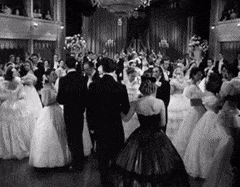Once again, What Women May Wear has made the news, this time from the Missouri State House of Representatives, where a female legislator put forward a motion last week to determine how much female legislators may bare arms. There’s too much heat and not enough light in the resulting kerfuffle. Let’s look at the issues.
Etiquetteer favors dress codes because they create and/or honor a Sense of Occasion — in this case, one hopes, the seriousness and professionalism of legislative action. All entities have the right to set dress codes for their members. Businesses establish dress codes for their employees. Schools set dress codes for their inmates:* students, faculty, and staff. So of course it makes sense that a legislative body has this right as well.**
Some have tried to cast this as men telling women what to wear. That argument is undercut by the fact that the changes were proposed by Representative Ann Kelley (R), who is not a man. Men make up a majority of the chamber, but they didn’t initiate this change. Since no member of a legislature should be forbidden to consider anything having to do with its rules of conduct, of course male legislators had to vote on it.
Some have groused that the dress code for male legislators wasn’t also changed. We are nowhere near that future Utopia — if such Utopia be — unburdened by gender and gender-based clothing. The last time that was attempted 50-odd years ago all we got were jumpsuits and his-and-hers nylon briefs***. Etiquetteer is persuaded by Rep. Kelley that “new rules for women would mirror the dress code language for men” and would argue that the men’s dress code is already more restrictive. Women bare their legs to whatever the fashionable hemline is. Male legislators don’t and daren’t; long trousers remain the expectation****. The jacket and long-sleeved shirt remain standard for businessmen, though some will try to get away with short sleeves.
Some have argued that we have more important things to talk about than women’s clothes, and we do. But Etiquetteer is tired of that argument. Universal interest in women’s clothes has eclipsed that of men’s for millennia, including by women. There’s an entire industry built up about people talking about women’s clothes. Right or wrong, it absorbs us. The point is, women are now seen much more for their amazing achievements than hitherto. Legendary US Senator Margaret Chase Smith (R-ME) is remembered for the fresh rose she wore in her lapel every day, but revered for her stand against evil US Senator Joseph McCarthy (R-WI). Her words have come down through History more than her accessories.
How might this have been handled with more Perfect Propriety? Is there some bipartisan women’s caucus in the Missouri State House? If not, it needs to get formed pronto so that issues like this can be discussed by those it affects directly before a floor vote. Really, people! This didn’t have to become part of the National Discussion. And while they’re caucusing, they can debate other issues of even greater importance to the women of Missouri, and just maybe make some significant bipartisan progress.
In summary, problems get solved with communication, what defines professional attire for women may still be interpreted more widely than for men, and while men may have opinions about what women wear, women will no longer tolerate being told what to wear by men. Etiquetteer is now going to retreat to the fitting room.
*Not the best choice of word, to be sure.
**This New York Times article about the kerfuffle includes some interesting details about dress codes in other state legislatures.
***Etiquetteer isn’t even going to bother laying a wreath on the graves of those trends.
***Etiquetteer was so interested to see that US Senator John Fetterman (D-PA), famous for his sweatshirts and cargo shorts, was sworn in looking Perfectly Proper in a new dark blue suit and necktie. It remains to be seen how much he’ll challenge the men’s dress code in the US Senate when it resumes business later this month.























